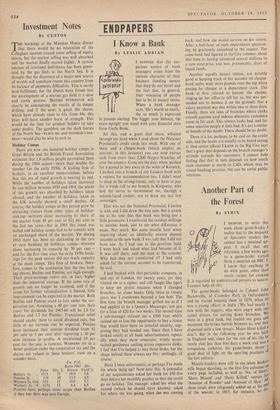Investment Notes
By CUSTOS
rTIHE warnings at the Mansion House dinner
I that there would be no relaxation of the Callaghan squeeze caused some selling of equity shares, but the market selling was well absorbed and the market finally moved higher. A certain amount of irrational bullishness has been gener- ated by the gas finds in the North Sea. It is thought that the discovery of a major new source of wealth will somehow rescue this country from its balance of payments difficulties. This is surely wish-fulfilment, for the, Dutch have found that the development of a marine gas field is a slow
and costly process. BRITISH PETROLEUM will shortly be announcing the results of its deeper drilling, and if the news, is good, the shares, which have already risen to 61s. from 44s. this year, will have another burst of strength. This would be the time for prudent holders to take some profits. The gamblers on the dark horses of the North Sea—PLACE OIL and TRINIDAD CANA- DIAN—would also be wise to cash in.
Holiday Camps There are now one hundred holiday camps in
Great Britain and the British Travel Association estimates that 1.8 million people patronised them during the 1964 season—more than, double the number for the early 1950s. A leading firm of brokers, in an excellent memorandum, believe that this era of rapid growth is nearing its end.
While the number of holidays taken increased by one million between 1950 and 1964, the whole of this growth was absorbed by holidays taken abroad, and the number of holidays taken in the UK actually showed a small decline. Of course, the holiday camps in this period grew by attracting visitors from other types of holiday- making—BUTLINS alone increasing its share of
the market from 48 per cent to 621 per cent in the last ten years—but in 1964 this trend was halted and holiday camps had to be content with an unchanged share of the market. Yet during 1965 there has been no slackening in the rate of new building by holidays camps—PONTINS alone increasing its capacity by 30 per cent—
and for the first time since the early 1950s book- ings for the peak season did not reach capacity at the main camps. This firm of brokers, there- fore, comes to the conclusion that the two lead- ing shares, Butlins and Pontins, are high enough. Their price-earnings ratios are, in fact, higher than the industrial average. If the same rate of growth can no longer be assumed, and if the scope for further rationalisation is limited, little improvement can be expected in the market. Both Butlins and Pontins stand to lose under the cor- poration tax. Assuming a 40 per cent rate, their cover for dividends for 1965-66 will be 1.0 for Butlins and 1.2 for Pontins. Transitional relief should enable them to avoid dividend cuts, but little or no increase can be expected. Pontins have increased their interim dividend from 4+ per cent to 5 per cent after reporting a 20 per cent increase in profits. A maintained 10 per
cent for the year is forecast. WARNERS are in a better position under the corporation tax and the
shares are valued in these brokers' view on a sounder basis. Est. PIE..
Ratio 1965 Div Price Div. % Season Yield % Butlin's Is. .. 10/3 55 18.0 5.4 Pontins 2s. .. 3/0 10 13.5 6.5 Warners 2s. Ord. 5/6 15 10.0 5.5
Warners 2s. 'A' 4/7+ 15 8.6 6.5
Pontins have perhaps more scope than Butlins if they buy their way into Europe.






































 Previous page
Previous page